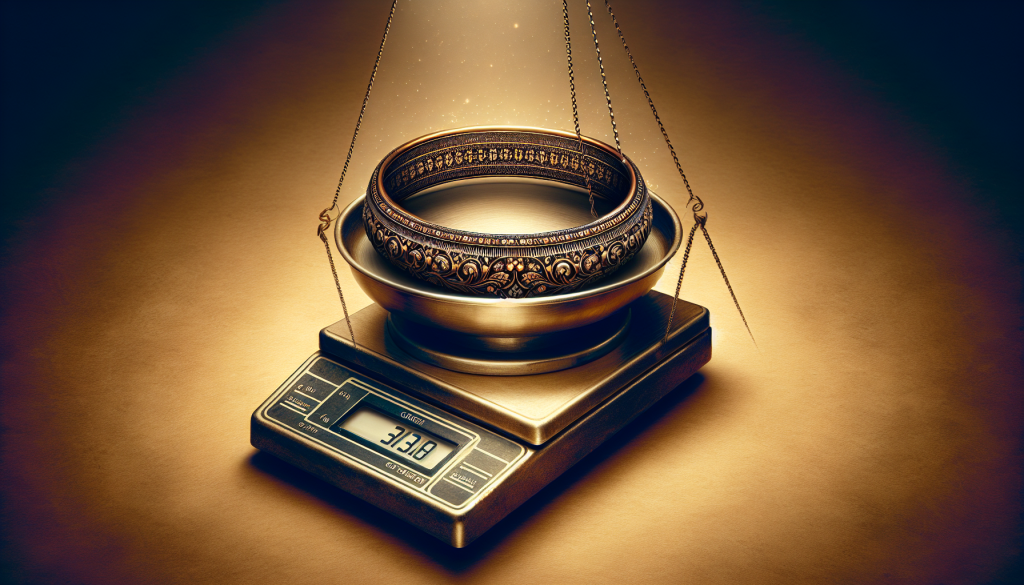Have you ever wondered about the weight of a bangle? Whether you’re a jewelry enthusiast or just curious, knowing how many grams a single bangle weighs can be quite fascinating. In this article, we will explore the weight of a typical bangle and uncover the surprising variety of weights across different styles and materials. From delicate gold bracelets to chunky silver cuffs, get ready to discover the hidden world of bangle weights. Prepare to be amazed!
Vicoter Velvet Jewelry Box 24 Grid Jewelry Ring Display Organiser Box Tray Holder Earrings Storage Case for Girls Wife Mom Women (Pink)
$7.99 (as of January 29, 2026 15:55 GMT +00:00 - More infoProduct prices and availability are accurate as of the date/time indicated and are subject to change. Any price and availability information displayed on [relevant Amazon Site(s), as applicable] at the time of purchase will apply to the purchase of this product.)JAMEND CLXP Lotus Leaf Shape Decorative Ring Tray, Small Key Bowl, Ceramic Trinket Tray Jewelry Dish Organizing Necklace Earrings, Home Decoration for Mom Best Friend Sister, Pink.
$6.98 (as of January 29, 2026 15:55 GMT +00:00 - More infoProduct prices and availability are accurate as of the date/time indicated and are subject to change. Any price and availability information displayed on [relevant Amazon Site(s), as applicable] at the time of purchase will apply to the purchase of this product.)Vlando Jewelry Box for Women, Glass Lid Jewelry Organizer with 3 Drawers for Necklaces Rings Earrings Bracelets Mother Day Gift for Mom - Cloud White
$29.99 (as of January 29, 2026 15:55 GMT +00:00 - More infoProduct prices and availability are accurate as of the date/time indicated and are subject to change. Any price and availability information displayed on [relevant Amazon Site(s), as applicable] at the time of purchase will apply to the purchase of this product.)COLLECTIVE HOME - Ceramic Jewelry Tray, Decorative Trinket Dish for Rings Earrings Necklaces Bracelet Watch Keys, Birthday Mother's Day Christmas Gift for Women, 4.75", White Surface (M)
$13.99 (as of January 29, 2026 15:55 GMT +00:00 - More infoProduct prices and availability are accurate as of the date/time indicated and are subject to change. Any price and availability information displayed on [relevant Amazon Site(s), as applicable] at the time of purchase will apply to the purchase of this product.)BAGSMART Travel Jewelry Organizer Case Foldable Small Jewelry Roll for Journey Rings, Necklaces, Earrings, Bracelets,Mini,Soft Pink
$15.99 (as of January 29, 2026 15:55 GMT +00:00 - More infoProduct prices and availability are accurate as of the date/time indicated and are subject to change. Any price and availability information displayed on [relevant Amazon Site(s), as applicable] at the time of purchase will apply to the purchase of this product.)
Understanding Bangles
Bangles, also known as bracelets, are a popular form of jewelry worn on the wrist. They consist of a rigid ring or band that encircles the wrist, often decorated with various designs and embellishments. Bangles are not only a fashion statement but also hold cultural and symbolic significance in many cultures.
What are Bangles?
Bangles are a type of jewelry that is worn around the wrist. They can be made from various materials such as gold, silver, platinum, or even traditional materials like glass, wood, or clay. Bangles come in different sizes, shapes, and designs, allowing individuals to express their personal style and adorn their wrists with beautiful accessories.

Types of Bangles
There is a wide variety of bangle styles available, catering to different preferences and occasions. Some common types of bangles include:
- Plain Bangles: Simple and elegant, these bangles are smooth and lack any intricate designs.
- Textured Bangles: These bangles have textured surfaces, adding depth and visual interest to the jewelry.
- Gemstone Bangles: Embedded with precious or semi-precious gemstones, these bangles exude luxury and glamour.
- Filigree Bangles: These bangles are intricately crafted with delicate metal wires to create elaborate patterns.
Materials Used in Bangles
Bangles can be crafted from various materials, each with its own unique characteristics and appeal. Here are some commonly used materials for making bangles:
- Gold: A highly prized and valuable metal, gold bangles are known for their rich color and luster. They can range from pure gold to gold alloys, which are mixed with other metals to enhance durability.
- Silver: Silver bangles offer a more affordable alternative to gold. They have a cool, shimmering appearance and can be worn for both casual and formal occasions.
- Platinum: Known for its durability and hypoallergenic properties, platinum bangles are highly valued. They have a beautiful silvery-white color that does not fade over time.
- Traditional Materials: Traditional bangles can be made from materials like glass, wood, bone, or clay. These bangles often hold cultural significance and are distinct to specific regions or communities.

Factors Affecting Bangle Weight
The weight of a bangle is influenced by several factors that contribute to its overall appearance and feel. Understanding these factors can help you choose the right bangle that suits your preferences. Some key factors affecting bangle weight include:
Design and Shape
Bangle designs can vary from thin and delicate to bold and chunky. The intricacy of the design and the amount of metal used to create it can significantly impact the weight of the bangle.
Size and Diameter
The diameter of a bangle determines how it fits around the wrist. Smaller bangles will naturally weigh less than larger ones due to the reduced amount of material used.
Thickness
The thickness of the bangle’s band plays a role in its weight. Thicker bangles tend to be heavier as they contain more metal, while thinner bangles are lighter.
Material Density
Different materials have different densities, which affects the weight of the bangle. For example, gold is denser than silver, so a gold bangle of the same size will weigh more than a silver bangle.
Average Bangle Weight
The weight of a bangle can vary widely depending on factors such as material, design, and size. Here is a general overview of the average weights for different types of bangles:
Gold Bangles
Gold bangles can range from delicate and lightweight to bold and heavy. On average, a 14k gold bangle will weigh between 6 to 30 grams, while an 18k gold bangle can weigh anywhere from 8 to 40 grams.
Silver Bangles
Silver bangles are generally lighter compared to gold bangles. On average, a sterling silver bangle may weigh between 5 to 15 grams, depending on its design and thickness.
Platinum Bangles
Platinum bangles are known for their durability and weight. The average weight of a platinum bangle can range from 10 to 30 grams, depending on its design and size.
Traditional Bangles
Traditional bangles made from materials like glass, wood, or clay are usually lightweight. Their weight can vary significantly based on the specific material used and the intricacy of the design.

Converting Bangle Weight to Grams
Understanding how to convert bangle weight to grams is essential when assessing the value and cost of a bangle. Here are the weight calculations for different materials:
Gold Weight Calculations
To convert the weight of a gold bangle to grams, you can use the following formula:
Grams = (Weight in Carats) × (0.2)
For example, if a gold bangle weighs 15 carats, the weight in grams would be: 15 x 0.2 = 3 grams.
Silver Weight Calculations
For silver bangles, the weight conversion is straightforward. The weight in grams is the same as the weight in ounces. For example, if a silver bangle weighs 10 ounces, it will also weigh 10 grams.
Platinum Weight Calculations
The weight of a platinum bangle can be converted to grams using a similar approach to gold. Multiply the weight in carats by 0.2 to obtain the weight in grams.
Identifying the Weight of a Bangle
Determining the weight of a bangle is crucial when purchasing or valuing this piece of jewelry. There are a few methods you can use to identify the weight accurately:
Jeweler’s Markings
Jewelers often mark bangles with the weight, metal purity, and other relevant information. These markings can be found inside the bangle’s band or on the clasp, providing you with valuable information about its weight.
Using a Jewelry Scale
If the weight is not indicated on the bangle, you can use a jewelry scale to measure its weight accurately. Place the bangle on the scale and ensure it is calibrated correctly for reliable results.

Factors to Consider When Buying Bangles
When shopping for bangles, several factors come into play to ensure you find the perfect piece. Consider the following factors before making your purchase:
Personal Style and Preference
Bangles should reflect your personal style and complement your wardrobe. Choose a design, metal, and size that resonates with your personal taste and fashion sense.
Occasion and Purpose
Consider the occasion or purpose of wearing the bangle. Is it for everyday wear, special occasions, or for a specific cultural or religious ceremony? The occasion and purpose will guide you in selecting a suitable bangle.
Budget
Set your budget and identify the range of bangles that fall within it. This will help you find options that align with your financial constraints without compromising on quality or design.
Durability
Evaluate the durability of the bangle and ensure it can withstand regular wear and tear. Consider factors such as the metal’s hardness, clasp strength, and overall craftsmanship.
Caring for Bangles
Proper care and maintenance are essential to keep your bangles looking their best and lasting for years to come. Follow these tips to care for your bangles:
Cleaning and Polishing
Regularly clean your bangles to remove dirt, oils, and any residue that may accumulate. Use a soft cloth and mild jewelry cleaner suitable for the specific metal. Polish the bangle gently to restore its shine.
Storage Tips
When not in use, store your bangles separately to prevent scratching or tangling. Use individual jewelry pouches, compartments, or a jewelry box with soft lining to protect your bangles from damage.
Avoiding Damage
Take caution when wearing your bangles to prevent accidental damage. Avoid wearing them while engaging in activities that could cause dents, scratches, or impact. Remove your bangles before swimming or applying harsh chemicals to protect their integrity.

Popular Bangle Designs
Bangles come in a variety of designs to cater to different tastes and preferences. Here are some popular designs you might consider:
Plain Bangles
Simple and classic, plain bangles are versatile and can be worn for any occasion. They can be sleek and thin or wider for a bolder look.
Textured Bangles
Textured bangles add visual interest to your wrist. They can feature patterns, engravings, or even hammered surfaces that catch the light and create dimension.
Gemstone Bangles
For an elegant and luxurious touch, gemstone bangles are a perfect choice. These bangles feature gemstones like diamonds, rubies, emeralds, or sapphires, adding sparkle and color to your wrist.
Filigree Bangles
Filigree bangles showcase intricate metalwork with delicate and ornate designs. They are crafted using thin metal wires twisted and soldered together to create beautiful patterns.
Bangle Sizing
Choosing the right bangle size ensures a comfortable and secure fit. Consider the following when determining the appropriate size:
Determining the Right Size
Measure your wrist using a soft measuring tape or a piece of string. Allow for some room between your wrist and the bangle to ensure a comfortable fit. Refer to a bangle size chart or consult with a jeweler to find your ideal size.
Adjusting Bangle Size
Some bangles come with adjustable closures or clasps that allow for resizing. They can be expanded or tightened to fit different wrist sizes, providing versatility and convenience.
Resizing
For non-adjustable bangles, it’s best to consult with a professional jeweler to resize them. They have the expertise and tools necessary to adjust the bangle’s size while maintaining its integrity.
Historical Significance of Bangles
Bangles hold great cultural and historical significance in many parts of the world. They have been worn for centuries and carry symbolic meanings and traditions:
Cultural Importance
Bangles play a vital role in cultural traditions and ceremonies. In many cultures, bangles are worn by married women as a symbol of their marital status or to signify their participation in religious rituals.
Symbolism and Rituals
Bangles can symbolize various aspects such as prosperity, fertility, good luck, or protection. They are often gifted during significant life events, such as weddings or childbirth, as a way to convey blessings and well wishes.
To wrap up, understanding the different aspects of bangles, including their types, materials, weight, care, sizing, and historical significance, allows for a more informed and enjoyable bangle purchasing journey. Whether you are choosing a bangle for personal wear or as a meaningful gift, the wide range of options available ensures there is a perfect bangle to suit every style, occasion, and preference. So go ahead and embrace the beauty and symbolism of this timeless accessory.





